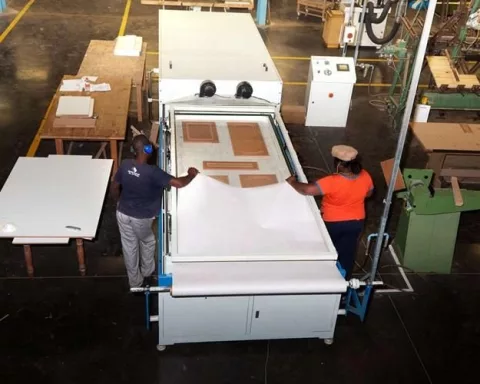Cape Town is investing R77 million in a program to tackle youth unemployment and skills shortages in informal settlements. The program provides temporary employment contracts as janitors and diverse training programs, aimed at reducing unemployment and boosting confidence and independence among participants. With an emphasis on personal development and valuable work experience, the program is a powerful investment in the future of Cape Town’s youth.
Cape Town’s Investment in Youth Empowerment and Skill Development
The City of Cape Town has invested R77 million in a comprehensive skill development program aimed at tackling youth unemployment and skills shortages in informal settlements. The initiative provides temporary 18-month employment contracts as janitors, accompanied by diverse training programs and certificate of competence upon successful completion. The ultimate goal is to reduce unemployment, address skills shortages, and instill confidence, independence, and social integration amongst participants.
A Pioneering Initiative to Tackle Unemployment
The City of Cape Town has made a noteworthy investment of a substantial R77 million in a comprehensive and ambitious skill development programme. The goal of this programme is to address both the issue of youth unemployment and the glaring skills shortage in informal settlements. This initiative provides a clear reflection of the city’s dedication to the cause of its young populace.
The objective of this initiative is not merely to provide employment, but also to empower its recipients, most of whom are underprivileged youth from the city’s informal settlements. The programme, skillfully crafted by Cape Town’s Water and Sanitation Directorate, is set to benefit nearly a thousand youthful individuals. The project is an integral part of the larger Expanded Public Works Programme (EPWP) planned for the 2024/2025 fiscal year.
The programme aims to provide its participants with various opportunities, including job placements, accredited training, and an outlook of a promising future. The initiative has been structured to deliver comprehensive assistance to the youth, helping them to overcome the challenges they face in their quest for employment and skill enhancement.
An Innovative Approach to Employment and Skills Training
The core of this ambitious programme revolves around offering temporary 18-month employment contracts to young individuals aged between 18 and 35, in the capacity of janitors. The Informal Settlements Basic Services Branch, an integral arm of the Water and Sanitation Directorate, plays a pivotal role in this initiative. Their crucial responsibility is to ensure that the sanitation facilities in the informal settlements maintain high standards.
However, the role of the janitors is not confined to cleaning tasks. The young participants will also participate in a variety of training programs covering diverse fields. These include plumbing, computer literacy, customer relations, driving skills, and financial literacy. This approach intertwines the practical aspects of essential duties with opportunities for personal and professional growth.
Upon successful completion of each module, the participants will receive a certificate of competence. These certificates are not merely symbolic, but they carry significant value, as they are accompanied by National Qualifications Framework (NQF) credits.
Balancing Work and Training for a Brighter Future
The programme extends its focus to individuals employed directly by the City and those working through City-appointed contractors. The contracts establish a six-day working week, with training sessions scheduled during regular working hours.
Councillor Zahid Badroodien, the Mayco Member for Water and Sanitation, explains the reasoning behind the decision to extend the contract duration from one year to 18 months. This extension stems from the desire to invest more in improving the lives of these young individuals and to equip them with the necessary tools for a brighter future.
Beyond employment and training, the programme also aims to instill confidence, promote independence, and encourage social integration amongst its participants. Additionally, it strives to improve service delivery by providing impactful customer relations training.
A Powerful Investment in the Future
The programme’s ultimate goal is to reduce unemployment in the informal settlements, address the prevalent skills shortage, and provide valuable work experience. This is expected to make the participants more competitive in the job market.
The City’s financial contribution to this programme is more than just an investment; it is a powerful commitment to the future. It represents faith in the abilities and potential of Cape Town’s youth and is a courageous move towards a more inclusive and empowered society.
The programme promises to be a transformative experience for the participants, combining elements of employment, training, and personal development. The impact of this initiative is expected to resonate within and beyond the informal settlements of Cape Town, laying the foundation for a brighter, more hopeful future for its young residents.
1. What is Cape Town’s investment in youth empowerment and skills development?
Cape Town has invested R77 million in a comprehensive skill development program aimed at tackling youth unemployment and skills shortages in informal settlements.
2. What does the program provide for its participants?
The program provides temporary 18-month employment contracts as janitors, accompanied by diverse training programs and certificate of competence upon successful completion.
3. What is the goal of the program?
The ultimate goal is to reduce unemployment, address skills shortages, and instill confidence, independence, and social integration amongst participants.
4. What kind of training programs are offered?
The training programs include plumbing, computer literacy, customer relations, driving skills, and financial literacy.
5. What kind of impact is expected from the program?
The program is expected to reduce unemployment in the informal settlements, address the prevalent skills shortage, and provide valuable work experience, making the participants more competitive in the job market.
6. What is the significance of Cape Town’s investment in the program?
The City’s financial contribution to this program is more than just an investment; it represents faith in the abilities and potential of Cape Town’s youth and is a courageous move towards a more inclusive and empowered society.












